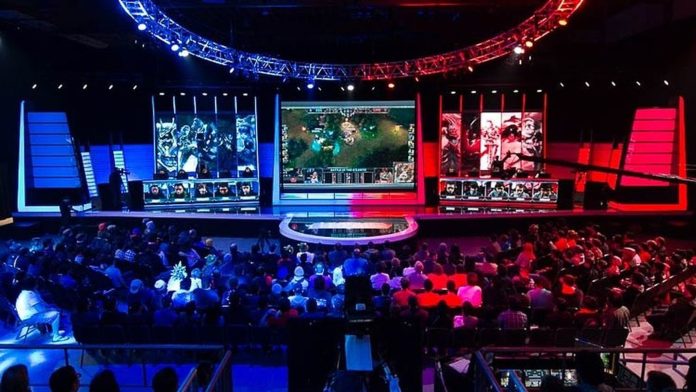
From relatively obscure origins, the advent of cryptocurrency has fuelled a blockchain (or, less catchy, “distributed ledger technology”) boom in recent years. This is evident in the incredible rise in the value of BitCoin (the first implementation of the technology). And with the similar aim of creating greater transactional security and automation, smart contracts have become a technology that various industry sectors are looking to incorporate into their daily operations.
Esports is also going through a remarkable growth phase, and its tech-savvy stakeholders and fan base make it fertile ground for experimentation with both blockchain and smart contracts, as the industry continues to look out for innovative ways of gaming, spectating, and organising compelling events. Yet BitCoin has had its critics (as have other cryptocurrencies), and its value fell to a fifth of its peak within months. Meanwhile, the application of smart contracts is in practice currently limited to relatively simple transactions. So, as with any boom, the question is: do blockchain and smart contracts offer a sustainable foundation on which to build the esports of the future?
This article examines some of the ways in which blockchain and smart contracts could potentially drive change in the esports industry.
Jump to:
Blockchain
Blockchain has the potential to transform many industries, ranging from healthcare and banking to retail and law, but the term is often misunderstood. Essentially, the blockchain acts as a system for the decentralised storage and (in some cases) decentralised encryption of transaction data in a long chain of data blocks. It is a decentralised ledger, stored electronically by multiple devices (the ‘nodes’); and typically when someone seeks to make a transaction that they wish to record on the blockchain, the transaction must be submitted to the nodes, which will verify and approve the transaction according to the verification protocol of the relevant blockchain. Certain ‘mining’ nodes collect new verified transactions into a block and when they find a ‘proof-of-work’ (or whatever else is required under the applicable ‘consensus mechanism’ of the blockchain) it broadcasts the block to all nodes. The other nodes verify the result of the process used by the broadcasting node to confirm compliance with the relevant consensus mechanism and accept the block only if all transactions in it are valid. At this point the transaction is processed and the verified ‘block’ is added to the ‘chain’. So, taking BitCoin as the classic example, if person A wishes to obtain 1 BitCoin from person B, they will submit a transaction to the nodes that manage the BitCoin ledger, who will verify that person B does in fact hold that BitCoin, that he/she wishes to transfer it to person A, and that person A wishes to acquire it. Upon verification by a sufficient number of nodes the transaction will be verified and packed into a block. When that block is then verified in accordance with the relevant proof of work consensus mechanism, the BitCoin ledger will be updated accordingly.
Generally speaking, blockchain’s popularity is based on three key features:
- It’s transparent. This means anyone can see transaction histories and verify ownership of an item.
- It’s immutable. The data stored on the blockchain cannot be altered without a sufficient consensus of nodes, making it potentially more secure and trustworthy.
- It’s decentralised and efficient. This is most apparent when using the technology for transactional purposes; by transacting peer-to-peer, middle-men, such as credit card companies who might take a cut of every transaction, are cut out of the process.
The first known commercial transaction using BitCoin took place in 2010, when an individual purchased two pizzas in Florida for a total of 10,000 BTC which, at the time of writing, would be worth almost £70,000,000.
Smart contracts
Decentralised ledgers can be used in combination with smart contracts to help with the exchange of money, property, shares, or anything of value in a transparent, conflict-free way that avoids the services of a middleman. A smart contract is a computer code that sets out the basic terms of a contract and is ‘self-enforcing’. It is pre-programmed to ensure that when certain conditions are met, the contract is concluded and the promised performance is rendered. By automating the contractual process smart contracts are designed to provide for a secure and efficient means for parties to transact with one another. Where a smart contract is hosted on a blockchain, its terms will be publicly available (but often the parties will be anonymised).
Esports
‘Esports’ is essentially an umbrella term for competitive video gaming. Although there’s nothing new about people playing video games against one another – and one of the first large scale competitions (using the game Quake) was held as far back as 1997 – the development of games that make for compelling viewing (as well as playing), together with the advent of streaming technology and social media, have allowed the industry to take off in recent years. One need only look at the prize pool for the 2017-2018 competitive Fortnite season, where Epic Games put up the huge sum of $100,000,000, to see how far the industry has come.
Being based on video games, connected technology and content sharing, the esports industry is both quick to understand the potential use-cases for blockchain and smart contracts, and agile enough to be able to implement those use-cases at speed. Indeed, fans of game like World of Warcaft and EVE Online have traded in virtual currency (often given a real world value) for many years.
For the good of the game – helping competition organisers to level-up
Esports competitions are often large, complex events, involving thousands of entrants in a mixture of online and stadium-based action. When operating at that scale, smart contracts hosted on a blockchain ledger can both drive efficiency and promote security, thereby helping to ensure the sporting integrity of the competition. For example, pay-outs for large competitions can be managed through smart contracts so that, based on a player’s performance in a competition, the contract will automatically pay out to players as they finish, depending on the predetermined value set for their finishing position. This allows for instant realisation of payouts/earnings and transparency of contract terms. In an industry that has witnessed a number of instances of players (and teams) not being paid, this could be an effective means of protecting participants.
As well as implementing smart contracts for earnings, competition organisers could also leave core aspects of the administration of their competitions to smart contracts. By using smart contracts, prospective players can agree to the competition terms (providing that those players have verified that they meet the entry criteria, potentially via blockchain) and enter themselves in the competition, picking a match and completing the results table (with the results being verified using blockchain) as they go. The competition organiser’s role is therefore simplified; they would just need to secure the competition prize fund on the blockchain, ready to be paid out automatically as per the terms of the smart contract. This could also allow for organisers with small teams to run various competitions concurrently, minimising the administrative burden.
Or some competition organisers may look to take blockchain a stage further, using it to build their own esports ecosystem within their proprietary platforms. Intergalactic Gaming (IG), for example, are developing a platform whereby a central token on the TRON blockchain – Intergalactic Gaming Gold (IGG) – is used as a form of tradeable value within the platform, whether for prize pools, for player compensation, to buy merchandise or for a range of other activities. The IG platform will also enable IG’s partners whether teams, players, sponsors or others) to create their own tokens which can be traded against IGG on the IG platform and on other partner exchanges. IG’s aim is to use this tokenised infrastructure to both create a compelling product for fans and provide an ‘all-in-one’ platform that can stand out from what some perceive as an otherwise highly fragmented esports ecosystem.
Yet continuing growth is projected for the esports industry with or without blockchain and smart contracts. Can the industry take this technology further so that blockchain and smart contracts become a true enabler of growth? Will smart contracts ever be sufficiently sophisticated, for instance, to allow the tournament organiser to exploit players’ image rights, or impose confidentiality obligations on them? And how will they address some key legal issues, such as determining the appropriate governing law and forum for a contract established using a decentralised ledger? Ultimately, for major professional events some form of supporting documentation (whether competition rules, participation agreements, or another form of terms and conditions) are currently still required. But could platforms like EDGE Esports, designed specifically for the esports industry to facilitate smart-contracting between players, teams, leagues and others; or Cortex, which uses AI to enhance the complexity of contracts that can be supported and executed on-chain, be the key to unlocking the true potential of this technology in the esports sector?
Teams – raising funds, building brands and scouting talent
Many esports teams have conducted ‘initial coin offerings’ or ‘ICOs’ as a means of raising funds for their activities, but an ICO is also an effective means of developing brand identity. Being regulated (at present) differently from other crowdfunding models, they can be quick to set-up and can take off rapidly. A simple scan of the market reveals coins for all kinds of ventures across a range of industries: for example Dentacoin exists for dental practitioners to share data and purchase supplies, as well as for patients to pay for treatment; and FUNK is the cryptocurrency for the band “Cypherfunks”, and exists to support them and perform other functions such as tipping the band or buying beers at gigs. However, ICOs need to be carefully designed in order to avoid entering the territory of financial services or capital markets regulation (e.g. in relation to electronic money or securities).
Esports teams can make use of ICOs by creating select pieces of merchandise, to be purchased via their coin only, or by offering other rewards and incentives such as letting viewers participate with/against them in matches by paying a certain amount of their currency. With more teams taking part with their own ICOs, there is also the possibility of enhanced competition between team coins, whereby the real value of a team’s coin may fluctuate against the other whilst a match is being played between the two teams, bringing a new level of engagement to the audience.
Outside of fund raising and brand building, one of the major challenges in the professional esports scene is the barrier to entry for unknown players. See, for example, the excitement created when a previously unknown player won the inaugural FIFA 18 Global Series event in January 2018, only to then go on and win the FIFA 19 Ultimate Team Champions Cup at the end of the year. Unlike traditional sports, esports is yet to gain established methods of “scouting” for new talent and, similar to traditional sports, a player in a country other than those well-established in the esports sphere may be overlooked entirely.
Blockchain could – in theory – provide a solution to this issue by creating a publically accessible ledger of player portfolios, whereby all players could be ranked globally, regardless of their fame (or infamy) using a verifiable list of player metrics based on their gaming records, directly linked to various gaming platforms. However, in adopting this sort of technology the industry will have to guard against so-called ‘doxxing’ – the posting of personal information on the internet without that person’s consent and with malicious intent. The immutability of data on the blockchain means that doxxing can lead to ‘privacy poisoning’, because once on the blockchain that information cannot be altered or deleted without affecting the entire chain, potentially destroying the careers of rising stars. It will be interesting to see how these issues are confronted as the technology develops.
Raising the stakes – blockchain and esports gambling
With esports becoming the fastest-growing sports betting market globally, and the issue of lootboxes making a series of national regulators turn their eye to the video gaming industry, the industry is very much at the forefront of developments in the gambling sector. Whilst some companies are already bringing lootboxes to the blockchain, another opportunity could be the prospect of blockchain gambling for esports audiences whereby they can place bets on a secure platform, perhaps even wagering the tournament organiser’s version of cryptocurrency.
Skins in the game
‘Skins’ are virtual, in-game items with purely cosmetic value, such as an outfit for a character or a colour-scheme for a weapon. They have become highly sought-after, collectors’ items in the esports ecosystem, trading hands for many thousands of pounds. However, they also have a tumultuous past, plagued by fraud and counterfeiters, as well as a vast number of unlicensed skins gambling platforms. Pro-active game developers have made significant strides in looking to overcome these issues, and skins are now commonly being used as rewards for competitions and subsequently wielding incredibly high values. Companies have even begun creating specialised tokens to trade these high-value in-game assets.
One idea has been to develop a universal inventory for skins and in-game assets in general via blockchain, which (although it would be quite an undertaking) would open up a range of possibilities for players, streamers and game developers. Meanwhile, Non-Fungible Tokens (NFTs) provide another means of ensuring that particularly rare skins remain authentic and unique. NFTs are unique cryptographic tokens within the blockchain, otherwise known as “Cryptocollectibles”, and can be traded for real money or cryptocurrency. By creating NFT skins for esports competition winners – game developers can create truly unique items that cannot then be replicated in-game, essentially creating a “limited edition” skin with a history behind it.
Blockchain and broadcast – enhancing streaming
Esports audiences are often in the tens of millions, and given that audience’s appetite for high quality video content such as 8k resolution or 4k standardised for Virtual Reality, blockchain enthusiasts have begun toying with the idea of hosting streaming content on a blockchain itself – using different computer nodes to store different parts of one overall file. The advantages of this are higher streaming speeds (by amalgamating processing power), easier storage of data, less chance of data corruption and security. With most major blockchain projects using open source licenses to permit collaboration and decentralised development of software, the license conditions attached to the new software (whether “copyleft” or “permissive”) can make it difficult, at least for the average Joe, to monetise innovative ideas like this.
However, within esports private companies like Sliver.TV’s Theta are now looking at taking the basic model that these blockchain enthusiasts have developed, monetising it, and providing esports audiences with a unique way to be a part of the streaming process, whilst making money and interacting with esports personalities in a way in which they couldn’t do via traditional streaming and broadcast models.
Unblocking the potential – how far can smart contracts and blockchain take us?
There is clearly enormous scope for smart contracts and blockchain to nourish the continuing growth and development of the esports ecosystem. Yet, as with any disruptive technology, there are plenty of obstacles to surmount. Whether it’s using VR and blockchain to set a new streaming service apart, or using AI to take smart contracting to a new realm of intelligence, it seems that we won’t see the true impact that smart contracts and blockchain can have on the market until they are combined creatively with other emerging technologies. And we are sure that there are plenty of players ready and able to make that happen.









